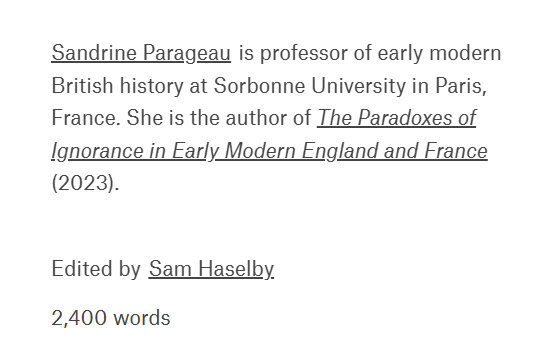Welcome to DU!
The truly grassroots left-of-center political community where regular people, not algorithms, drive the discussions and set the standards.
Join the community:
Create a free account
Support DU (and get rid of ads!):
Become a Star Member
Latest Breaking News
Editorials & Other Articles
General Discussion
The DU Lounge
All Forums
Issue Forums
Culture Forums
Alliance Forums
Region Forums
Support Forums
Help & Search
Was Rene Descartes a lying fraud?


https://aeon.co/essays/was-rene-descartes-a-self-centred-guru-and-a-lying-fraud

The Blind Leading the Blind (1568) by Pieter Bruegel the Elder. Courtesy the Museo di Capodimonte, Naples/Wikipedia

The French philosopher René Descartes (1596-1650) is generally presented as one of the founders of modern Western philosophy and science, the man who made reason the principle of the search for truth, and who formulated the cogito, ‘I think, therefore I am.’ His assertion of mind-body dualism has given rise to a great number of objections over time, from those of 17th-century theologians to those of 20th-century feminists. In France, even though the decision of the 1792-95 National Convention to transfer Descartes’s remains to the Pantheon in Paris was not followed through, the philosopher is nonetheless regarded as ‘un grand homme’, a national hero, and being labelled ‘Cartesian’ is still today a compliment that emphasises one’s common sense, good judgment and methodical use of reason.
Yet Descartes was not always the undisputed champion of reason that he is today. In 17th-century England and the Netherlands, he was publicly and repeatedly accused of being a fraud and of lying to his readers so as to manipulate them into becoming his disciples. Of course, as one would expect, many intellectual and scientific objections were raised by his contemporaries against Descartes’s philosophy. But those ad hominem allegations were of a different nature altogether: they implied that the French philosopher resorted to well-crafted and dishonest strategies to make his readers ignorant, and therefore gullible, with the aim of making them submit to his control. Thus, according to those critics, the founder of modern science was, in truth, a purveyor of ignorance.
Such an accusation was made for example by the Protestant scholar and theologian Meric Casaubon (1599-1671), a Geneva-born clergyman of the Church of England, in a long manuscript letter on ‘general learning’ written in 1668, in which he deplores what he perceives as the growing ignorance of his contemporaries. In this text, Casaubon accuses Descartes of deliberately encouraging his readers to make themselves ignorant by urging them to renounce their beliefs and forget all the knowledge that they have previously acquired: ‘a man must first strip himself of all that he has ever known, or believed.’
This accusation against the champion of rationalism may seem paradoxical at first, but it should not come as a complete surprise: if Descartes did not praise ignorance as such, and certainly not as an end in itself, he did encourage his readers to get rid of all their previous opinions, prejudices and false knowledge, as he himself had done after realising the uncertainty of the knowledge he had been taught as a child. Indeed, in the Discourse on Method (1637), Descartes relates how he initially loved philosophy, theology, poetry and mathematics, which he had been taught at the prestigious Collège Royal de La Flèche, before he became aware of the variety of opinions and the pervasiveness of error, which made him doubt all his knowledge and beliefs. In the Meditations (1641), a few years after the Discourse, Descartes further explains that, in the face of such doubt and uncertainty, he decided to get rid of all the opinions he had formed or acquired in order to rebuild science and knowledge on a firm basis. This experience of ‘radical’ or ‘hyperbolical’ doubt, as it has later been called, which results in the rejection of all knowledge, implying a form of self-induced ignorance, was unsurprisingly construed as an extreme stance by 17th-century commentators, and we may understand how it could be interpreted as a promotion of complete ignorance.
snip
5 replies
 = new reply since forum marked as read
Highlight:
NoneDon't highlight anything
5 newestHighlight 5 most recent replies
= new reply since forum marked as read
Highlight:
NoneDon't highlight anything
5 newestHighlight 5 most recent replies
Was Rene Descartes a lying fraud? (Original Post)
Celerity
Jul 8
OP
According to the Monty Python gang, "Rene Descartes was a drunken fart who was very rarely sober"...
wcmagumba
Jul 8
#1
wcmagumba
(4,726 posts)1. According to the Monty Python gang, "Rene Descartes was a drunken fart who was very rarely sober"...
markodochartaigh
(4,102 posts)2. The best
I can do is, cogito cogito, ergo cogito sum.
dutch777
(4,717 posts)3. Almost sounds like Trump read Descartes or at least studied his tactics to "make his readers...gullible".
struggle4progress
(124,595 posts)4. His Discourse on Method is quite good
He actually suggests a radical intellectual humility, in which one temporarily defers to people who probably know better, on almost all issues, while engaging in intense dedicated analysis of a single issue, where one hopes to make progress
werdna
(1,115 posts)5. Well as DesHorace, little known contemporary of Descartes, once said -
"Never put Descartes before DesHorace"!
![]()
![]()
![]()
![]()